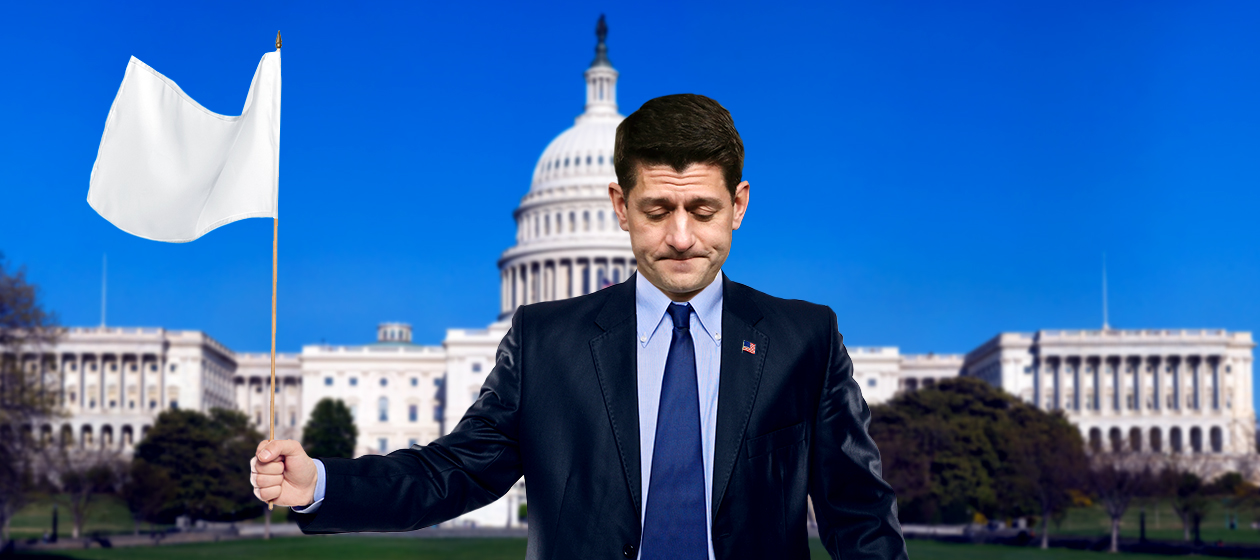Paul Ryan's final surrender
It's Trump's party now


A free daily email with the biggest news stories of the day – and the best features from TheWeek.com
You are now subscribed
Your newsletter sign-up was successful
House Speaker Paul Ryan is retiring from Congress. In the process, he's throwing in the towel in one final act of reckoning with President Trump's takeover of the Republican Party.
Ryan's retirement can be seen through several lenses. Through one, he's taking his tax cut and going home. Cutting taxes on the rich had long been the motivating force in Ryan's political career. With that achieved, he can happily exit the stage. (Ryan's other wish to eviscerate health care and food stamps for the poor will remain a dream deferred.)
Through another lens, Ryan is running from the blue wave gathering across the country before this year's midterm election. Ryan was facing an unusually tough re-election challenge from Democrat Randy Bryce, an iron worker who goes by the Twitter handle "Iron Stache." Rather than face a humiliating career-ending loss, Ryan is quitting preemptively.
The Week
Escape your echo chamber. Get the facts behind the news, plus analysis from multiple perspectives.

Sign up for The Week's Free Newsletters
From our morning news briefing to a weekly Good News Newsletter, get the best of The Week delivered directly to your inbox.
From our morning news briefing to a weekly Good News Newsletter, get the best of The Week delivered directly to your inbox.
But perhaps most significantly, Ryan's retirement signals a surrender in an intra-party fight against Trumpism that had establishment conservatives already barely on life support. Throughout the 2016 campaign, Ryan agonized over Trump and kept him at arm's length, demanding that the wrecking ball candidate win Ryan's endorsement by demonstrating a commitment to small-government conservative principles.
Trump espoused a brand of culturally conservatism nationalism that galled Ryan and his ilk among the GOP establishment. When Trump seized the Republican presidential nomination, Ryan figured he could bide his time, let Trump get crushed by Hillary Clinton, and then reclaim the GOP in the name of libertarian conservatism in the aftermath. When Trump pulled off his upset victory and consolidated his hold on the Republican base, Ryan undoubtedly knew the party had been irretrievably lost.
In truth, Ryan surrendered long ago. Since Trump took office, Ryan has kowtowed to him, plugged his ears in response to Trump's most egregious acts of authoritarianism, and willfully rendered his chamber impotent to check Trump's abuses of power. That will be the final legacy of his speakership: complicity.
And the house of cards that is Ryan's brand of plutocratic Republicanism has been falling for a while. Lee Atwater, a strategist to Ronald Reagan and George H.W. Bush, explained how Republicans merged an appeal to the cultural and racial resentments of white working-class voters with policy that favored the donor class:
A free daily email with the biggest news stories of the day – and the best features from TheWeek.com
You start out in 1954 by saying, "N-----, n-----, n-----" By 1968 you can't say "n-----" — that hurts you, backfires. So you say stuff like, uh, forced busing, states' rights, and all that stuff, and you're getting so abstract. Now, you're talking about cutting taxes, and all these things you're talking about are totally economic things and a byproduct of them is, blacks get hurt worse than whites. ... "We want to cut this" is much more abstract than even the busing thing, uh, and a hell of a lot more abstract than "N-----, n-----." [Atwater]
So when mainstream Republicans talked about shrinking the size of government and cutting taxes, the party's base heard dog-whistles toward cultural resentment. This allowed Republicans to get elected by covertly talking the talk of the white working class, only to govern by walking the walk of the donor elite.
The cracks in this con started to emerge in 2008. Sarah Palin gave the party base a taste of what it would be like to support a genuine populist Republican who was truly one of them. The Tea Party rebellion that emerged in response to Barack Obama's presidency was another crack — a backlash against cultural change, astro-turfed by FreedomWorks with euphemisms about federal debt, dressed up in Gadsden flags and tricorner hats.
Ryan went on to share a Koch brother's dream presidential ticket with Mitt Romney in 2012. But he did so only after a series of flameouts in the Republican primaries by lesser mini-Trumps like Michele Bachmann, Herman Cain, and Rick Santorum, as Republican voters searched desperately for someone who spoke authentically to their anger.
Trump's candidacy was an experiment. By discarding the "small government" varnish and speaking plainly about the supposed dangers and pathologies of immigrants and minorities, he collapsed Lee Atwater's abstract. He proved that all along, voters really wanted the dog whistle, not the abstract policies. They wanted someone who shared their white identity politics to give the forgotten working-class a voice against condescending elites.
Of course, not all Republican candidates were simply dog-whistling about small government. There were those like Ryan who appeared to be true believers in trickle-down economics and small-government conservatism. In Stephen Bannon's indelible characterization, Ryan was "born in a petri dish at the Heritage Foundation."
Trump didn't completely smash Ryan's Petri dish. He outsourced his administration's policymaking to Ryan and Senate Majority Leader Mitch McConnell, as long as they could deliver wins. But it was obvious who was serving who, as were the limits of Ryan's politics in the age of Trump.
Even with total control over the federal government, all that congressional Republicans could muster was a giant regressive tax bill principally meant to repay their donors.
With that last gasp, Paul Ryan is bowing out. And by leaving the field, he's conceding what has been clear for a long while: It's Trump's party now.
Joel Dodge writes about politics, law, and domestic policy for The Week and at his blog. He is a member of the Boston University School of Law's class of 2014.
-
 How the FCC’s ‘equal time’ rule works
How the FCC’s ‘equal time’ rule worksIn the Spotlight The law is at the heart of the Colbert-CBS conflict
-
 What is the endgame in the DHS shutdown?
What is the endgame in the DHS shutdown?Today’s Big Question Democrats want to rein in ICE’s immigration crackdown
-
 ‘Poor time management isn’t just an inconvenience’
‘Poor time management isn’t just an inconvenience’Instant Opinion Opinion, comment and editorials of the day
-
 The billionaires’ wealth tax: a catastrophe for California?
The billionaires’ wealth tax: a catastrophe for California?Talking Point Peter Thiel and Larry Page preparing to change state residency
-
 Bari Weiss’ ‘60 Minutes’ scandal is about more than one report
Bari Weiss’ ‘60 Minutes’ scandal is about more than one reportIN THE SPOTLIGHT By blocking an approved segment on a controversial prison holding US deportees in El Salvador, the editor-in-chief of CBS News has become the main story
-
 Has Zohran Mamdani shown the Democrats how to win again?
Has Zohran Mamdani shown the Democrats how to win again?Today’s Big Question New York City mayoral election touted as victory for left-wing populists but moderate centrist wins elsewhere present more complex path for Democratic Party
-
 Millions turn out for anti-Trump ‘No Kings’ rallies
Millions turn out for anti-Trump ‘No Kings’ ralliesSpeed Read An estimated 7 million people participated, 2 million more than at the first ‘No Kings’ protest in June
-
 Ghislaine Maxwell: angling for a Trump pardon
Ghislaine Maxwell: angling for a Trump pardonTalking Point Convicted sex trafficker's testimony could shed new light on president's links to Jeffrey Epstein
-
 The last words and final moments of 40 presidents
The last words and final moments of 40 presidentsThe Explainer Some are eloquent quotes worthy of the holders of the highest office in the nation, and others... aren't
-
 The JFK files: the truth at last?
The JFK files: the truth at last?In The Spotlight More than 64,000 previously classified documents relating the 1963 assassination of John F. Kennedy have been released by the Trump administration
-
 'Seriously, not literally': how should the world take Donald Trump?
'Seriously, not literally': how should the world take Donald Trump?Today's big question White House rhetoric and reality look likely to become increasingly blurred
